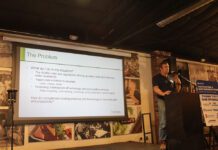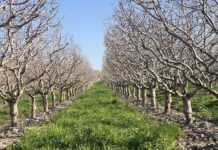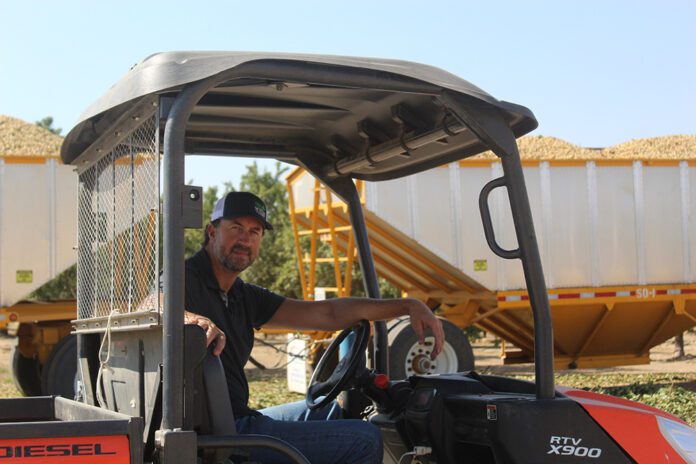
With growing pressure to produce more while using less, sustainability is no longer optional; it’s essential. For American Pistachio Growers (APG), that means integrating sustainable principles not only on the farm, but across its marketing, advocacy and industry leadership efforts.
As global demand for sustainable products increases and regulations tighten, APG is helping pistachio growers stay ahead of evolving standards and protect the industry’s long-term viability. With the recent addition of a sustainability director and the launch of a dedicated committee, APG is placing a larger emphasis on sustainability than ever before.
Sustainability is becoming critical to pistachio market growth, especially in export markets like Europe, sources say. To stay competitive, growers have to not only adopt sustainable practices but also clearly communicate those efforts to both buyers and consumers. As policies shift in response to consumer demand, particularly in key export markets, APG is closely monitoring emerging regulations that could impact international trade.
Joe Coelho, who leads sustainability and member outreach for APG, comes from a multigenerational farming family in California and has a background in agronomy, research and farm management across pistachios, almonds, strawberries and row crops.
During APG’s annual conference in February, Coelho stressed that financial, economic and operational sustainability must come first in agriculture before environmental or social goals can be achieved.
“Without a profitable farm,” he said, “we eventually do not have a farm and therefore cannot have environmental and social wins.”
At the same time, he emphasized the importance of staying proactive in navigating evolving standards.
“There’s strong interest in the EU on sustainable practices,” Coelho said. “And while it’s an ambiguous term, there are potential regulations around sustainability that could impact market access, so we have to keep our finger on the pulse.”
By positioning American pistachios as a premium, sustainably grown product, APG hopes to ensure that growers are not only meeting new standards but also expanding into emerging markets where sustainability is a key selling point.
But the organization’s efforts aren’t just about compliance. Sustainability is woven into APG’s global marketing strategy, reinforcing the message that American pistachios are among the highest-quality and most sustainably produced in the world.
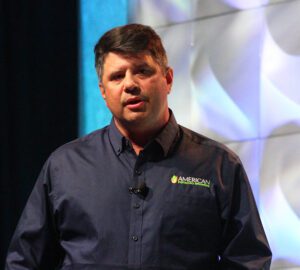
Advocacy and Stewardship
Beyond the field, sustainability involves guiding policies and regulations that will help secure the industry’s future. That’s why APG has been actively engaging with lawmakers to secure funding and advocate for policies that benefit pistachio growers, according to Government Affairs Director Katie Martin.
“Any policymaker or someone that creates or changes policy, we should be in front of them,” Martin said during APG’s annual conference. “We’re going to knock on every door that has a vote on anything that happens to our growers or processors.”
Those advocacy efforts have already helped the organization secure increased federal funding for sustainability programs. They have also leveraged grants through initiatives like the Market Access Program and the Regional Agricultural Promotion Program, both key tools that will help U.S. agriculture maintain a competitive edge globally.
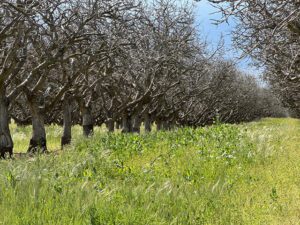
Inside the APG Sustainability Committee’s Goals
In 2023, APG launched an ad hoc sustainability committee, led by board member and Madera County grower Karun Samran, to deliver long-term value to growers by advancing practices that support both operational success and environmental responsibility.
“The main goal of the sustainability committee is a value add,” said committee member Justin Wylie. “As a board member for years, we’ve been looking at what we can do at APG to continue to add more value for the assessment dollars that we’re getting.”
Wylie, who lives and farms on a few acres in Fresno but primarily manages citrus and pistachio operations in Madera County, said one of the committee’s first major initiatives has been evaluating new technologies and products through on-farm trials in the Central Valley. These trials provide pistachio-specific data that can help guide more informed decision-making across the industry. Even in the early stages, he said, some of the results have been surprising as the committee assesses what works and what doesn’t.
For Wylie, sustainability is as much about environmental stewardship as it is a long-term business strategy. He said the committee is focused on identifying cost-cutting opportunities, improving resource efficiency and enhancing soil health, all while helping growers stay ahead of rising input costs and tightening regulations.
“We want our operations to be sustained and still be here in 10 years and not operating in the red,” Wylie said. “What can we do to cut costs, to save money, to maybe even increase the fertility of our soils so that we’re actually making progress on that front?”
At the same time, he stressed that profitability must remain the foundation for any sustainability effort.
“If it’s not improving the operation, if it’s not improving the bottom line, it’s not worth adopting,” he said.
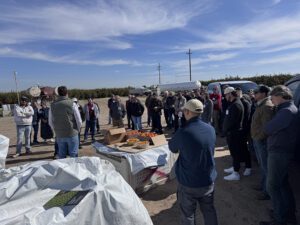
While targeted sprays have become a more standard practice, Wylie noted that what many growers might not realize is that most good soil biology is either severely suppressed or absent entirely. Research shows that when beneficial biology is missing, pathogens often fill the void.
“Using cover crops, good quality compost and even tools like microalgae or biological inoculants we brew on the ranches can quickly reduce the salt load in soils, build tree immunity and significantly improve the fertility of the soils in the long term,” Wylie said. “While relying only on salty soil amendments can have the opposite effect.”
The committee is also working to connect growers with grant funding to lower the financial barriers to adoption. “The idea would be to provide funding for growers so they can go out and adopt some of these practices, try the technologies, see what kind of results they get with zero risk,” he said.
Wylie has spent the past several years implementing regenerative practices like cover cropping on his own operation. While the benefits weren’t immediate, he said, the long-term impacts have been clear.
“The first year or two, it looks terrible, but over time, you start to see this amazing change,” he said, pointing to improved water infiltration, better soil structure and even reduced costs. “It actually ends up being a savings in your budget.”
For growers new to sustainable practices, Wylie recommends turning to the well-established body of research that supports many of today’s principles. He even has a favorite book recommendation on the subject.
“One that I really love is ‘Mineral Nutrition and Plant Disease,’” he said. “It’s an old book, but there’s some very traditional science around this.”
By fine-tuning mineral inputs, Wylie said, growers may be able to reduce certain plant disease pressures without relying solely on chemical sprays.
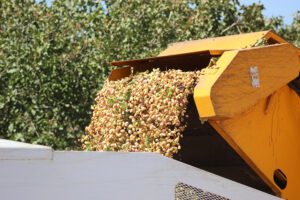
Building a Sustainable Future for Pistachio Farming
Coelho sees the sustainability initiative as one that must also filter out ideas that don’t serve growers’ bottom lines.
“There’s a whole lot of people now coming to you growers with sustainable solutions, sustainable offerings, with this necessary connotation of environmentalism,” Coelho said, calling himself a sort of “filter” for some of those things. “There are many people making suggestions that are going to help you spend past the point of diminishing returns.”
He believes sustainability must be led from the ground up, with APG playing a key role in supporting growers through real, measurable tools. After joining the organization’s ad hoc committee about two years ago, Coelho said he saw an opportunity to help shape the direction of its efforts.
In his hybrid role, he works to connect growers with researchers, government agencies and marketers, bridging knowledge gaps, securing funding and ensuring that best practices translate into both economic and environmental wins.
And his close collaboration with APG’s government affairs and marketing teams helps align outreach with broader industry needs.
“Sustainability reporting and compliance is something that we have to keep our fingers on,” Coelho said.
He explained that to support long-term viability, APG’s current initiatives focus on practical, cost-effective solutions like improving soil health, exploring biostimulants, advancing variable-rate technology and reducing input costs, all aimed at strengthening farm profitability while delivering environmental benefits.
With deep roots in California agriculture and firsthand experience as a grower, Coelho brings both technical knowledge and personal investment to APG’s sustainability goals.
“I’m on the same journey to try to sustain my farm,” he said. “Very simply, lowering your cost of production, enhancing your productivity, improving your net gains. I do believe, and through experience, I know, that efficacious solutions can also have environmental benefits, especially in pistachios.”

Kristin Platts | Digital Content Editor and Social Correspondence
Kristin Platts is a multimedia journalist and digital content writer with a B.A. in Creative Media from California State University, Stanislaus. She produces stories on California agriculture through video, podcasts, and digital articles, and provides in-depth reporting on tree nuts, pest management, and crop production for West Coast Nut magazine. Based in Modesto, California, Kristin is passionate about sharing field-driven insights and connecting growers with trusted information.








